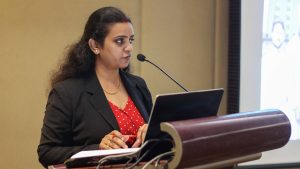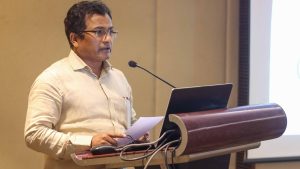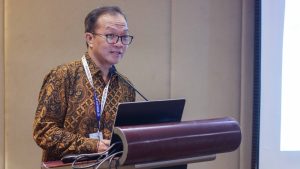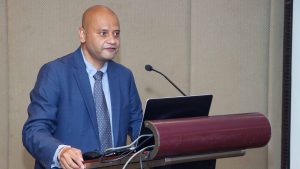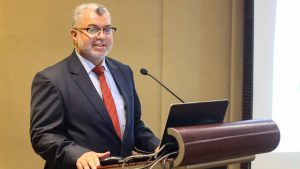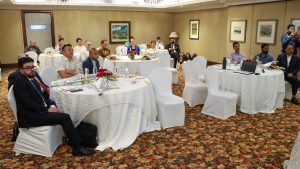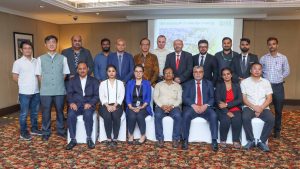All Management Events
- OMACS: the start-up initiative of Dr Udaya Shankar July 18, 2022
 Start-ups are the centers of innovation. Ideas may seem easy, but their implementation is not. Dr Udaya Shankar from the Department of Electronics and Communication Engineering is ready to confront the challenges of innovation by registering his new start-up, OMACS.
Start-ups are the centers of innovation. Ideas may seem easy, but their implementation is not. Dr Udaya Shankar from the Department of Electronics and Communication Engineering is ready to confront the challenges of innovation by registering his new start-up, OMACS.OMACS envisions becoming the best research lab and product company within the next five years. The company’s motto is based on the 3P’s, that is, patents, papers, and product prototypes. The mission is to collaborate with world-class researchers experienced in both academy and industry. This will bring together the best advisors who have expertise in research and industry in the areas of AI and Game theory applications to Visual Inspection systems, 5G wireless communication networks, NFTs for Telecom, and Agriculture Robotics.
This company will be focused on developing products based on AI/ML-based visual inspection systems, Advanced wireless communications, NFTs for telecom, etc. Currently, five students from the university are interning with him and helping him develop the products.
Nine members are already being trained in the respected areas by enjoying their exposure to the industry environment. Four more interns are to be recruited for the ongoing projects. OMACS is in discussion with other start-up companies to offer research support to them. After six months of its implementation, the start-up plan to provide employment to some of the students in the university and recruit world-class people.
Mr Udayan Bakshi, Associate Director of Entrepreneurship, has helped him to initiate the start-up under the Hatchlab Incubation Centre of the university. “In every step of the journey of OMACS, we got all the support from Hatchlab. We are thankful to Hatchlab for their constant support and encouragement,” said Dr Udaya Shankar as he recollected the dynamics of Hatchlab and OMACS.
Click to visit the company website
Continue reading → - Dr Partha Bhattacharjee July 18, 2022
- Dr J Vineesh Prakash July 18, 2022
- SRM University-AP organised Embassy Connect with 14 countries July 18, 2022
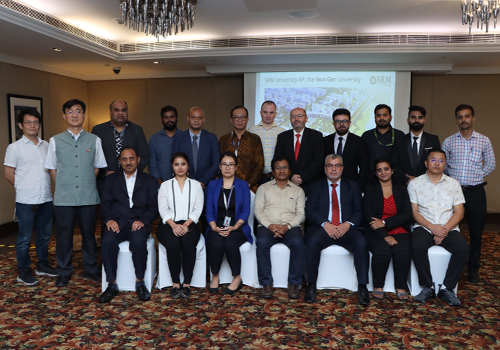 The office of International Relations and Higher Studies at SRM University-AP organised an Embassy Connect Programme, in which ambassadors, education attaches, cultural attaches of more than 14 countries and joint secretaries, and deputy secretaries of various regions from the Ministry of External Affairs participated.
The office of International Relations and Higher Studies at SRM University-AP organised an Embassy Connect Programme, in which ambassadors, education attaches, cultural attaches of more than 14 countries and joint secretaries, and deputy secretaries of various regions from the Ministry of External Affairs participated.Dr Naga Swetha Pasupuleti, Associate Director, Office of International Relations and Higher Studies at SRM University-AP, facilitated the Embassy Connect hosted in Delhi. The interaction aimed to build a bridge between the participating countries and India by promoting and providing high-quality higher educational programmes and opportunities to all sections and geographies.
Dy. Secretary for States from MEA – Mr Srinivas Reddy welcomed the gathering and emphasised the initiatives taken by the Government of India and how SRM University-AP can play a vital role in catering to global higher educational needs. Mr Aldrin Herwany, Education Attache from the Embassy of Indonesia, expressed keen interest in collaborating with SRM University- AP for exchange programmes, joint research and collaborations. While sharing some of his thoughts Mr Mahmoud A Ejweli, academic attache from the Embassy of Libya, said that India and Libya had always shared common interests almost since 1960 across several domains of Construction, Education and Health Care. He also added that India is the most sought destination for education.
Mr Sevala Naik, joint Secretary for West Africa, shared the steps and framework put in place to promote and extend quality education to African nations. He also mentioned that SRM University is one of the few institutions that have been approved by the grant commission of India to support and cater to the digital/virtual educational needs of African Countries, and already 400 plus students have been enrolled this semester from African regions into SRM University through this initiative. He also strongly emphasised that Indian education is one of the strongest, most economical and second to none of world-class institutions. He said India is bridging gaps between nations through one of the strongest pillars of education and knowledge transfer and applauded the contribution by SRM University-AP in this regard. Dr Naga Swetha shared the support and initiatives taken up, various scholarships being extended to African, SAARC and other nations by SRM University-AP, stressing on the vision of SRM University-AP’s management to cater world-class education to every aspiring and deserving student irrespective of class/creed/region.
Dr Naga Swetha emphasised and shared that SRM University-AP is home to a diverse, vibrant, and talented international student body. The office of International Relations and Higher Studies mete out effective services to the international student and scholar community. She also shared how the university is constantly thriving and becoming a global hub for opportunities, higher education, and entrepreneurship as it embarks on its 6th year of academic and research excellence.
The dignitaries from various embassies included Mr Elia Sevutia (Fiji), Mr Dolay Tshering (Bhutan), Mr Venkita Subramanian (Uzbekistan), Dr Om al Khair Abdullah Ahmed al Saaidi (Yemen), Mr Aldrin Herwany (Indonesia), Mr Sediqullah Sahar (Afghanistan), Ms Khadija Iman Einte (Somalia), Mr Mohammed A M Alghouwawi and Mr Mahmoud A Ejweli (Libya), Mr Roman Masarik (Czech Republic), Mr Eric Missah (Ghana), Mr Sevala Naik and Mr C Rajsekhar Reddy (Ministry of External Affairs, India), Vitali R. Moroz, third secretary, Embassy of Ukraine in the Republic of India, Roman Masarik, Charge d Affairs, Embassy of the Czech Republic In New Delhi, Dr Naga Swetha Pasupuleti, Associate Director – International Relations, SRM University-AP extended vote of thanks.
Continue reading → - DST-INSPIRE Subject Expert Committee Meeting July 18, 2022
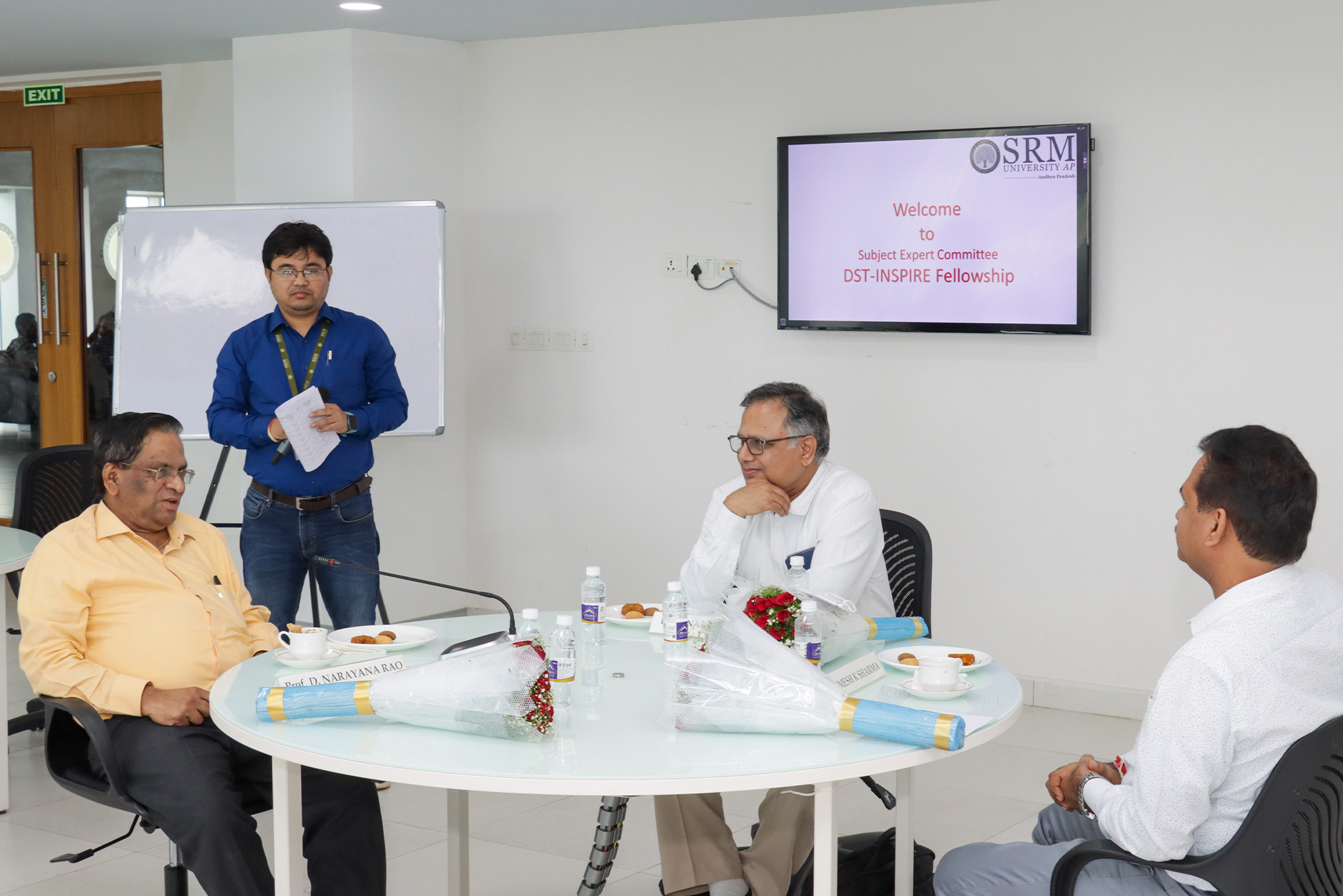 A two-day DST-INSPIRE Subject Expert Committee meeting was held on July 14 & 15 at SRM University-AP campus. Experts in the area of Physical Sciences from across the country gathered at the university to evaluate this year’s INSPIRE Fellowship applications in Physical Sciences.
A two-day DST-INSPIRE Subject Expert Committee meeting was held on July 14 & 15 at SRM University-AP campus. Experts in the area of Physical Sciences from across the country gathered at the university to evaluate this year’s INSPIRE Fellowship applications in Physical Sciences.INSPIRE Fellowship component offers 1000 Fellowships every year for carrying out doctoral degrees in both basic and applied sciences, including engineering and medicine, in the age group of 22-27 years.
The Chairperson of the Expert Committee in the area of Physical Sciences was Dr Dinakar Kanjilal, Professor, Inter-University Accelerator Centre (IUAC), New Delhi. “The fellowship ensures geographical distribution of excellence, and we look forward to more applicants from SRM AP”, Prof. Kanjilal said. Since its inception, SRM University-AP has INSPIRE Fellows as faculty members in the various departments of Sciences.
University Pro-Vice-Chancellor Prof D Narayana Rao, who also is the co-chair of the expert committee, said that it is gratifying to know that the PhD students have chosen to enrol in reputed universities and institutes. The applicants have chosen extremely accomplished scientists and faculty members as their research supervisors. “We are glad that 61 are girl students out of the 116 applications we received”, highlighted Prof D Narayana Rao. He expressed his happiness about the increasing number of women representation in Indian academia.
The other eminent scientists in the INSPIRE Fellowship selection committee included Member Secretary Dr Umesh K Sharma, Prof. Shikha Verma, Dr G. Vijaya Prakash, Dr AnandamayeeTej, Dr Rajendra Prasad Pant and Dr Arjit Chowdhuri.
Innovation in Science Pursuit for Inspired Research (INSPIRE)” is a flagship scheme of the Department of Science and Technology (DST), Government of India, which aims to attract meritorious youth to study basic and natural sciences at the college and university level and to pursue research careers in both basic and applied science areas including engineering, medicine, agriculture, and veterinary sciences.
Continue reading → - Dr Arghya Chakravarty July 15, 2022
- Dr Debabrata Pramanik July 15, 2022
- Optimised copper nanoclusters for bio imaging applications July 15, 2022
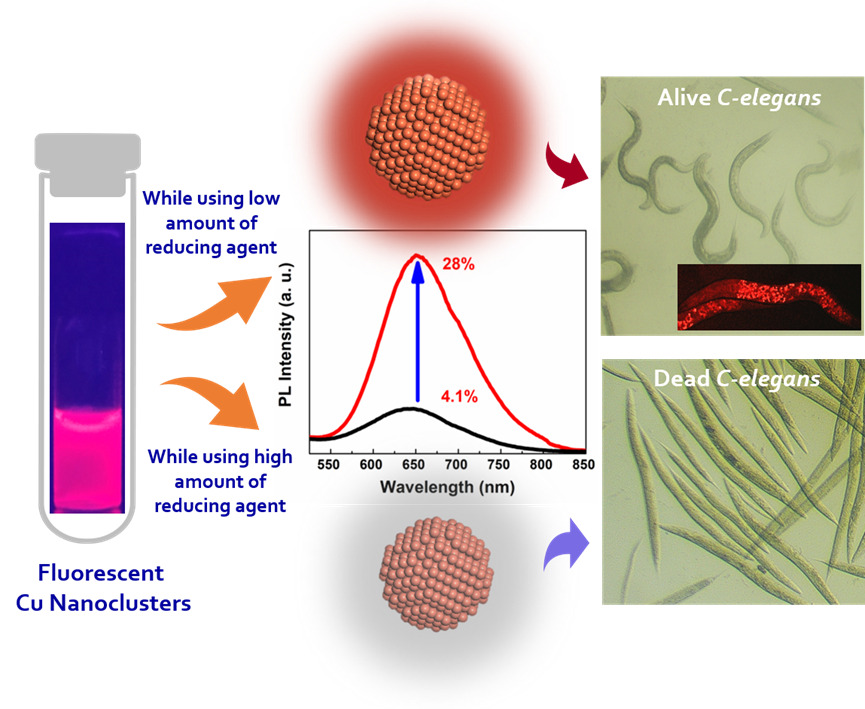
Inspite of being a plentiful and inexpensive metal, the use of copper nanoclusters is limited in bio-medical research because of their toxicity and low stability due to its easily oxidizable nature. It also has a low quantum yield. The interdisciplinary publication of the researchers at SRM University-AP successfully addressed these constraints, resulting in strong fluorescence, superior colloidal stability, and non-toxicity of copper nanoclusters for bio imaging applications. The research was a collective work of Dr Manjunatha Thondamal from the Department of Biological Sciences, Dr Mahesh Kumar Ravva and Dr Sabyasachi Chakrabortty from the Department of Chemistry along with their PhD scholars; Mr Kumar Babu Busi, Ms Kotha Jyothi, Ms Sheik Haseena, Ms Shamili Bandaru and Ms Jyothi Priyanka Ghantasala.
The article titled ‘“Engineering colloidally stable, highly fluorescent and nontoxic Cu nanoclusters via reaction parameter optimization” was featured in the prestigious Q1 journal RSC Advances (IF: 4.036), published by the ‘Royal Society of Chemistry’. They successfully prepared the protein stabilised copper nanoclusters inside the aqueous medium with exceptional optical properties. To the best of their knowledge, the reported colloidal stability and quantum yield of their as-synthesized Cu NCs are the highest reported in the literature, where the emission wavelength is in the red region. Also, optimised copper nanoclusters showed excellent biocompatibility towards solid cancer cell lines and C. elegans as in vitro and in vivo environments. Thus, these red colour luminescent copper nanoclusters were becoming a suitable fluorescent probe for deep tissue penetration, photodynamic, photothermal and diagnostic applications.
Abstract of the Research
Metal Nanoclusters (NCs) composed of the least number of atoms (few to tens) became very attractive for their emerging properties owing to their ultrasmall size. Preparing copper nanoclusters (Cu NCs) in an aqueous medium with high emission properties, strong colloidal stability, and low toxicity has been a long-standing challenge. Although they are earth-abundant and inexpensive, they are comparatively less explored due to their limitations such as ease of surface oxidation, poor colloidal stability, and high toxicity. To overcome these constraints, we established a facile synthetic route by optimizing the reaction parameters, especially altering the effective concentration of the reducing agent to influence their optical characteristics. The improvement of photoluminescence intensity and superior colloidal stability was modelled from a theoretical standpoint. Moreover, the as-synthesized Cu NCs showed a significant reduction of toxicity in both in vitro and in vivo models. The possibilities of using such Cu NCs as a diagnostic probe towards C. elegans were explored. Also, the extension of this approach towards improving the photoluminescence intensity of the Cu NCs on other ligand systems was demonstrated.
Continue reading → - Dr Chandana Deka July 15, 2022
- Kousik Das July 15, 2022


